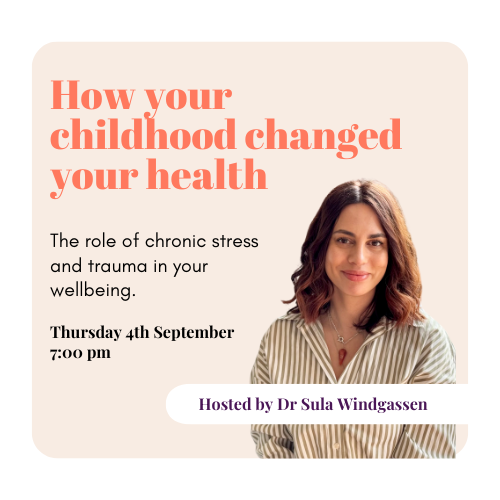It is well established that both trauma and adversity can physically change your body by dysregulating multiple biological processes in the body. I worked with a woman called Lisa*, who was frustrated and angry because no matter what she tried, her bladder burned. All around the clock she would find it impossible not to notice the sometimes extremely severe pain in her urethra and heavy, weighted feeling in her pelvis. She no longer had any sort of intimacy because her relationship with her pelvic regions was one of fear and frustration. As we unpicked her experiences and experimented with approaches to help her body ‘calm down’ around her bladder, she eventually told me that she had been sexually assaulted years before this pain started. When she told me, she was guarded. She did not want to be told her symptoms were the result of trauma because she felt that would make them less ‘real’. When I explored further with her, there was also part of her that felt like it would mean she was weak in some way. There was a sense of being betrayed by her body.
It was when I started to explore with her how, physiologically, a trauma like the one she had experienced might be ‘translated’ by the body, so that over time it might give rise to bladder symptoms like the ones she was having, that things started to change.
Lisa was - and is - not alone. Research investigating the relationship between trauma and bladder conditions found that those with interstitial cystitis/bladder pain syndrome were 10% more likely to have experienced sexual abuse or molestation before the age of 17 (1). The same study showed that those with IC/BPS who experienced abuse had higher sensory pain and poorer physical quality of life, than those who had not experienced abuse. Similarly, when assessing a sample of women with chronic pelvic pain, almost half had experienced previous abuse, with a third meeting the clinical diagnostic criteria for PTSD (2). In those diagnosed with overactive bladder syndrome, around a third reported childhood sexual trauma (3).
All these studies show, there is something about experiencing trauma (and a specific type of trauma) that makes disorders of the bladder and/or pelvic region more likely. The connection between the two, may be intuitive, as both concern similar areas of anatomy. But why would this be? What could the pathways be?
This opens other questions, like can the experience of specific types of trauma (only) affect specific related body regions, or can trauma more generally manifest? What determines whether trauma symptoms manifest in a localised manner or more generally?
The research showing that conditions and symptoms affecting the pelvic regions are significantly more likely when there has been a history of sexual abuse, suggest there must be some sort of physiological change at or near the site of the trauma (where there is a physical trauma site). In essence having something traumatic in a particular body region can lead to specific changes in that body region biologically that result in physical symptoms there. The question is; what changes and how does this occur?
I’m afraid there is not one answer because there is likely not one specific pathway. However, we can use Lisa’s* example to illustrate how this might work. Sexual trauma may cause the pelvic muscles to automatically tense to try and guard against further violation. Research demonstrates a link between sexual trauma and changed pelvic floor muscle functioning (4,5). This increased muscle tone (also called hypertonic pelvic floor or pelvic floor overactivity) can result in many different symptoms including pelvic pain, changed urination and bladder contractions and even sensitisation of nerves in pelvic organs and the bladder. It follows that one automatic bodily response in the pelvic floor can lead to multiple different pelvic and/or bladder (and even bowel) symptoms.
Outside of sexual abuse or trauma, traumatic accidents or injuries involving specific bodily areas, can result in changes to muscular activity and nerves in these areas and also change in how the brain processes sensory signals from these areas. This can be why, for example, pain can persist long after an injury has healed (6,7).
Not all trauma relates to specific body regions, however. And sometimes the specific body regions affected by trauma are not the ones later affected by physical symptoms. This is because trauma changes things in the body at a central level.
What I mean by this is, trauma changes brain processing, nervous system processing and even the function of the immune system, cardiovascular system and metabolic systems (8,9). These are biological hubs that determine so much of our physical experience and ultimately broader health. This can explain why 39% of people who went on to develop fibromyalgia (a condition includes a range of symptoms including widespread pain, fatigue, headaches and gut issues), had experienced trauma in the 6 months prior to symptom onset (10). Or why a nationwide study, found that those with a diagnosis of PTSD had 126% times higher likelihood of developing an autoimmune condition and that the more severe the PTSD symptomatology, the higher the risk of having an autoimmune condition became with as high as a 723% fold risk increase (11).
Whether or not you identify as having experienced trauma, the research poignantly demonstrates how your psychological experience transfers to a physical experience. How your body is constantly affected by how safe (or unsafe) you feel. How this gauge can make symptoms more likely or more severe or less likely and less severe.
Although you cannot micromanage your biology, you can work with it and you can make your body feel safer when under stress - whether that be stress of symptoms or stress of emotions or stress of circumstances.
If you’d like to explore this, you can check out the
free audio here.
Additionally, I will be hosting an upcoming webinar in September that covers the role of chronic stress and trauma on your wellbeing. You can find out more below. 
Body Mind Connect will be hosting an upcoming webinar that will explore the profound connection between childhood experiences and your health in adulthood, deep diving into how early stress and trauma create lasting changes in both brain and body. Our founder, Dr. Sula Windgassen, will draw on both research and clinical experience, and guide you through understanding how your early experiences can influence your physical and emotional wellbeing.


